|
July 2, 2016 - No. 27
149th
Anniversary of
Confederation
All Out to Give
Canada a Modern
Constitution and Definition of Rights

• A Modern
Constitution Is a Historic Necessity
North American
Leaders'
Summit
• Activists Hold Vigorous Picket
Against Summit Agenda
• New Phase to Entrench the United States of
North American Monopolies
- Enver Villamizar -
• Statement of CPC(M-L)
• Condemn Mexican Government's
Criminal Repression of
Teachers and Students!
Say No! to Canada
Post's
Attacks on Workers and the Public Interest
• Postal Workers on the Front Lines
Defending
Their Rights and the Public Post Office
• Trudeau Government's Agenda for
Rollbacks and Privatization
- Louis Lang -
• Dangers Posed to Public Post
Office by
Trans-Pacific Partnership Trade Deal
149th Anniversary of Confederation
All Out to Give Canada a Modern Constitution and
Definition
of Rights
July 1 marks the 149th anniversary of Confederation,
the
date on which the British North America Act, 1867 went
into effect and united four separate colonies of the British
Empire in North America into the Dominion of Canada. This included
the all-unsurrendered Quebec nation and the Indigenous nations on
the territory, which have been subject to the worst attacks and
Divide and Rule from the Anglo-Canadian state to this day.
The British North America Act, 1867 remains the
constitutional framework for Canada despite all the changes which
have come about in life since that time, be it Canada gaining its
formal independence, the extension of the franchise and other
privileges from white men of property to other citizens, the
development of a socialized industrial base, and a powerful,
educated working class hailing from every corner of the world
taking its place across the land.
This
itself
requires
serious thought. After nearly 150 years, two world
wars and the end of the bipolar division of the world, the Constitution
and the definition of rights flowing from it need to be brought on par
with the needs of the times. Far from recognizing this, the Trudeau
Liberal government has launched a program for the 150th anniversary of
Confederation in 2017 to "celebrate our common values, our
achievements, our majestic environment and our place in the
world." The official themes declared by the government are
"diversity and inclusion, reconciliation with Indigenous peoples,
environment and youth." A private group called Celebrations Ottawa Inc.
has been given $210 million in government funding and responsibility
for organizing the official events. Through this organization the
government will "invest strategically in activities that support the
vision for the 150th anniversary and encourage the direct participation
of Canadians," the government says. In other words, those who support
"the vision" as espoused by the state institutions of 1867 will receive
official support.
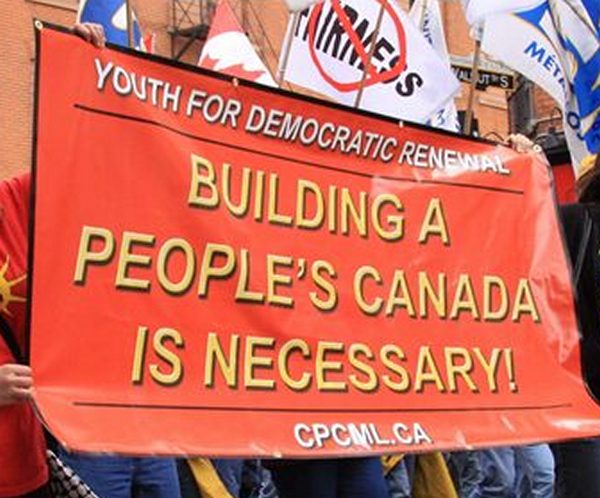 Who decided this
vision? What about the activities of those who have another vision? Are
they not entitled to receive government support? The government has
decided that those who share the vision it espouses uphold "Canadian
values." This suggests that those who espouse a different vision do not
share Canadians' "common values." It is nonsense. If there is a common
value Canadians share it is the right of all human persons to their
conscience, to the vision of Canada they see fit to espouse. The
government says that our strength lies in our diversity, by which it
singles out various characteristics based on appearance, language,
religion, skin colour, race, ethnic origin, ability, etc. In all of
this, the right to conscience -- the very thing that distinguishes us
as human beings -- is not considered a "common value." If this is the
case, what does it tell us about the basis on which citizenship rights
are being conferred today? The right of human beings to be must be the
very basis of the definition of rights in the 21st century, but the
government pays this no heed. Who decided this
vision? What about the activities of those who have another vision? Are
they not entitled to receive government support? The government has
decided that those who share the vision it espouses uphold "Canadian
values." This suggests that those who espouse a different vision do not
share Canadians' "common values." It is nonsense. If there is a common
value Canadians share it is the right of all human persons to their
conscience, to the vision of Canada they see fit to espouse. The
government says that our strength lies in our diversity, by which it
singles out various characteristics based on appearance, language,
religion, skin colour, race, ethnic origin, ability, etc. In all of
this, the right to conscience -- the very thing that distinguishes us
as human beings -- is not considered a "common value." If this is the
case, what does it tell us about the basis on which citizenship rights
are being conferred today? The right of human beings to be must be the
very basis of the definition of rights in the 21st century, but the
government pays this no heed.
The Communist Party of Canada (Marxist-Leninist) has
begun a year-long program to involve Canadians, Quebeckers, citizens
and residents from all walks of life in the work for democratic
renewal, and to modernize the Constitution based on the principle that
rights belong to us by virtue of being human and the need for a free
and equal union between Quebec, the Indigenous nations and the rest of
Canada.
CPC(M-L) emphasizes that this is an historic task, not
a
matter of a policy choice. It is required so that the working
people who produce all the wealth can take the centre stage of
history and carry out the changes required to overcome the
problems facing the society in the sphere of the economy and the
natural and social environment.
To be kept informed about the activities and writings
of
CPC(M-L) in the coming year, email office@cpcml.ca.

A Modern Constitution Is a Historic Necessity
Canada Day 2016 marks the beginning of one year of
preparation to mark the 150th anniversary of Confederation in
1867. All the developments in the recent history of Canada point
to the urgent need to provide Canada with a modern constitution
that vests sovereignty in the people instead of a foreign
monarch, gives expression to democratic renewal, provides equal
rights and duties for all, and which emanates from the people
themselves, instead of being imposed on them by a privileged few
who hold power. Recent history also points to the need to renew
confederation on the basis of the sovereign will of the people to
stop the nation-wrecking of those who have submitted the country
to the decision-making power and empire-building of global
monopolies, supranational trade and U.S.-led military alliances
and accords.
 A modern constitution for
Canada must end the colonial
injustice suffocating the Indigenous peoples and implement the
principles of nation-to-nation relations. It must recognize
Quebec's right to self-determination, provide guarantees for
citizens and residents of the rights they possess by virtue of
being human, and set the stage for the democratic renewal of the
political process so that the peoples of Canada can directly
decide the matters that concern them and affect their lives. A modern constitution for
Canada must end the colonial
injustice suffocating the Indigenous peoples and implement the
principles of nation-to-nation relations. It must recognize
Quebec's right to self-determination, provide guarantees for
citizens and residents of the rights they possess by virtue of
being human, and set the stage for the democratic renewal of the
political process so that the peoples of Canada can directly
decide the matters that concern them and affect their lives.
History calls on the peoples of Canada, Quebec and the
Indigenous peoples to establish modern arrangements amongst
themselves based on a free and equal union of sovereign entities.
On this basis they can face the challenges of the 21st century
with the people recognized as sovereign and in control over
decision-making, the institutions of the state and the direction
of the country.
Where Sovereignty Is Vested
The Constitution of Canada based on the 19th century
arrangement of the British North America Act still
considers the Queen of England to be the sovereign of Canada and
its head of state. The document A Consolidation of the
Constitution Acts 1867 to 1982 provided by the Department of
Justice stipulates, "The Executive Government and Authority of
and over Canada is hereby declared to continue and be vested in
the Queen." When the BNA Act, an act of the British
Parliament was patriated to Canada in 1982, then-Prime Minister
of Canada Pierre Trudeau along with the provincial Premiers did
not see fit to remove this anachronism from the fundamental law
of the land. Again, during the talks that led to the Meech Lake
Accord of 1987 and in the report on the consensus between the
Prime Minister and 10 Premiers that led to the Charlottetown
Accord of 1992, no recommendation was made to repeal this
clause.
 A change from sovereignty residing in the monarch to
sovereignty residing in the people is not a minor one but a
radical departure from the rule of the few in their narrow
interests over the many, to the rule of the many in the broad
public interest. It is not possible to have a modern constitution
consistent with the aspirations and demands of the people at this
time in history without a clear affirmation and definition that
the people are sovereign. The sovereign power sanctions
everything fundamental in terms of the law of the land and
everything that emanates from it. A change from sovereignty residing in the monarch to
sovereignty residing in the people is not a minor one but a
radical departure from the rule of the few in their narrow
interests over the many, to the rule of the many in the broad
public interest. It is not possible to have a modern constitution
consistent with the aspirations and demands of the people at this
time in history without a clear affirmation and definition that
the people are sovereign. The sovereign power sanctions
everything fundamental in terms of the law of the land and
everything that emanates from it.
This anachronism has not been removed because the
sovereign
power of the state has been transferred to the Prime Minister and
Premiers as Queen in Parliament, the Legislatures and National
Assembly of Quebec. Keeping the Queen of England as the formal
titular head of state allows the ruling elite to hide this fact.
The authority of the prime minister and premiers is absolute in
the English tradition of concentrating power in the
Crown-in-Parliament.
When the Prime Minister or Premiers say they have a
mandate
to rule for an allotted time frame, legally the Canadian
Constitution allows them to do so in an absolutist manner within the
separation of the federal and provincial powers. Were the
Constitution to declare that sovereignty resides with the
Canadian people, then it would have to stipulate the rights and
duties the people grant their governments, and how the
governments are to be chosen by the people. A change in this
regard would necessarily mean recognizing and establishing in law
that the people are sovereign and creating the legal means to
enable them to be so. This formidable epoch-changing modernizing
of the Constitution is not something the present ruling elite are
either willing to accomplish or capable of doing.
A democracy that does not provide the citizens of the
country
with the means to exercise control over the policies and decisions of
the elected bodies according to the fundamental law they
themselves have enacted, is a form of authoritarian and
absolutist rule.
The constitutional arrangements of the last 149 years
have
never vested sovereignty in the people. On the contrary,
Confederation in 1867 was a power-sharing arrangement between
Britain and the local ruling elite and concerned itself mainly
with the division of powers between the central government and
the provinces. The promise to submit the agreement that united
four provinces into a dominion for the people's approval was
quickly abandoned when it became clear that it would have been
rejected. Neither the 1982 repatriation of the Constitution and
addition of a Charter of Rights and Freedoms nor any of
the changes made since have overcome the fact that the Constitution of
Canada does not emanate from the people and that
Confederation did not permit a free and equal union of sovereign
peoples.
Quebec Is Said to Be One of Two "Founding Nations" of
Canada But Is Not a Signatory to the Constitution
Act
of
1982
Quebec is not a signatory to the Constitution Act of 1982 as a
result of the obstinate refusal of the ruling elite to recognize its
right to self-determination. Attempts to sort out Quebec's place in
Confederation have failed time and again because all have sought to
maintain the anachronistic Anglo-Canadian state arrangements which
refuse to recognize this right.
 One of the main obstacles
to the resolution of the place of
Quebec in or out of Confederation and a practical means used to
deprive the people of Quebec of their rights over this entire
period is the following: from the outset, the aspirations of the
people to take control of decision-making has been eclipsed by
the imposition of divisions based on considerations of origin,
language or religion. It began with the Durham Report of 1839,
which declared that the problem in Canada was the emergence of a
"mortal hatred" between "two races, the French and the
English." One of the main obstacles
to the resolution of the place of
Quebec in or out of Confederation and a practical means used to
deprive the people of Quebec of their rights over this entire
period is the following: from the outset, the aspirations of the
people to take control of decision-making has been eclipsed by
the imposition of divisions based on considerations of origin,
language or religion. It began with the Durham Report of 1839,
which declared that the problem in Canada was the emergence of a
"mortal hatred" between "two races, the French and the
English."
Durham's assertion was a deliberately false
representation of
what had taken place during the Rebellion of 1837-1838 against
British rule in Lower Canada. It was an application of the famous
British empire-building strategy of divide and rule. The same was
done a few years later in India. The British empire-builders
proclaimed that the problem in India was that the Muslims and
Hindus hated each other. In actual fact Indians of all origins
and religions had united against British rule in the War of
Independence of 1857. The big lie of hatred amongst the people
permitted the British colonialists to present themselves as the
peacemakers and spread the empire-builders' doctrine of
tolerance. Justin Trudeau invokes tolerance in a similar manner
today to stigmatize anyone contesting the present constitutional
arrangements as intolerant and backward.
To ensure that the Canadian colonies were seized by
resentments based on ethnic and language differences, the Durham Report
openly recommended the assimilation of French Canadians, whom it called
"a people with no literature and no history." From this self-serving
and anti-people perspective, the British empire-builders imposed a
legislative union of Upper and Lower Canada and a factional system of
party government. This set the stage for institutionalized politics of
fomenting antagonisms amongst the people and dividing them along party
lines.
The Liberal Party of today is born out of a division of
the
Parti Rouge created by the Patriots to pursue their cause
following the crushing of the Rebellions. Some in the Parti Rouge
were enticed into the politics of division while those who
opposed the division and continued the republican ideas of the
Patriots were persecuted, isolated, imprisoned, left stranded
and even ostracized by the Church, their writings forbidden
to be distributed and read. The champions of the politics of
division went on to create the Liberal Party of Canada following
Confederation.
 The fight for a republic in
Lower Canada against the
undemocratic rule of the colonial power and its local ruling
elite of the Chateau Clique comprised of rich and powerful
merchants had united all democratic-minded people whatever their
origin. Their struggle was accompanied by a similar uprising in
Upper Canada led by William Lyon Mackenzie directed against the
privileges and stranglehold of the ruling clique called the
Family Compact. The fight for a republic in
Lower Canada against the
undemocratic rule of the colonial power and its local ruling
elite of the Chateau Clique comprised of rich and powerful
merchants had united all democratic-minded people whatever their
origin. Their struggle was accompanied by a similar uprising in
Upper Canada led by William Lyon Mackenzie directed against the
privileges and stranglehold of the ruling clique called the
Family Compact.
The politics of division has been used ever since to
weigh
down the people of Quebec and act as an instrument of oppression
of the Quebec nation, with adherents both inside and outside
Quebec and even inside and outside the nationalist movement. The
motion adopted in 2006 by the government of Stephen Harper
"recognizing the nation of Quebec" asserts, "This House
recognizes that the Québécois
form a nation within a
united
Canada." The motion confines the nation of Quebec to an ethnic
group whose language is French. The motion does not include
people speaking other languages and of other origins as part of
the nation of Quebec or the Indigenous peoples. The motion
introduces a diffuse notion of Québécois
without a
defined
territory but rather one comprising separated communities across
Canada of French Canadian descent. In this convoluted framework,
the "nation of Quebec" can never be conceived as sovereign and
having the right to self-determination up to and including the
right to secede from Canada.
To confine the notion of Quebec to an ethnic group of Québécois
was also the strategy used by Pierre Elliott
Trudeau
to deny
the existence of the nation of Quebec and the people of
Quebec their national rights. In the 1960s, Pierre Trudeau
proclaimed nationalism to be "backward" and an enemy of the
modern state, on which he imposed his own self-serving irrational
definition of a nation. He claimed the nation of Quebec did not
exist but was simply a large ethnic group within Canada.
"Biculturalism" was introduced as the official policy of the
Canadian state as a means to circumvent and undermine the demands
and aspirations of the nation of Quebec and Indigenous nations
and to weaken the unity of all the peoples of Canada and Quebec
and their demand for new arrangements capable of resisting the
empire-building of U.S. imperialism.
After the October 2015 federal election, Justin Trudeau
applied a similar conceit to Canada saying, "There is no core
identity, no mainstream in Canada. There are shared values --
openness, respect, compassion, willingness to work hard, to be
there for each other, to search for equality and justice."
As concerns Quebec, Justin Trudeau said on several
occasions that "nationalism is an old idea from the 19th century" and
is based on "a smallness of thought." He further claims that Canada is
"the first postnational state." This desire of Trudeau the younger that
Canada be a "postnational state" can be set within the perspective of
Trudeau the elder with his assertions of "backward nationalism" in the
1960s and 1970s and his prejudice equating nationalism with
small-mindedness. The attack of father and son Trudeau on what they
call narrow-minded nationalism boils down to an attack on the right of
the people to build their decision-making power at their level against
the concentration of power in the hands of the privileged few. This
extends from the rebellion against colonial control and iron grip of
the rich merchants of the Chateau Clique in the 19th century to the
supranational economic and military decision-making bodies such as
NAFTA and NATO in the hands of the most powerful global monopolies and
empire-builders of today.
 The people are aware that
the deliberate silence of the
Justin Trudeau Liberals on the issue of Quebec is the seed of
tomorrow's hysteria and crises because it originates in the
obstinate refusal to recognize Quebec's right to
self-determination and the people's right to be and to govern
themselves with modern institutions. The ruling elite are
incapable of providing Canada with a modern perspective of a free
and equal union of the peoples of Canada, Quebec and Indigenous
peoples. In the Canadian federalism based on liberal notions of
empire-building, people are subjects and the sovereign power
resides in the monarch, which today is a front for the
concentration of power in the hands of the Prime Minister's
Office acting on behalf of the most powerful monopolies centred
in the U.S.-led imperialist system of states. The people are aware that
the deliberate silence of the
Justin Trudeau Liberals on the issue of Quebec is the seed of
tomorrow's hysteria and crises because it originates in the
obstinate refusal to recognize Quebec's right to
self-determination and the people's right to be and to govern
themselves with modern institutions. The ruling elite are
incapable of providing Canada with a modern perspective of a free
and equal union of the peoples of Canada, Quebec and Indigenous
peoples. In the Canadian federalism based on liberal notions of
empire-building, people are subjects and the sovereign power
resides in the monarch, which today is a front for the
concentration of power in the hands of the Prime Minister's
Office acting on behalf of the most powerful monopolies centred
in the U.S.-led imperialist system of states.
The movement for the affirmation of Quebec's
sovereignty,
whether in the form of a referendum on independence or in the
form of a refusal to adhere to the colonial Constitution,
contributes to opening the door to the progress of Canada and
Quebec. It calls into question the outdated and self-serving
constitutional arrangements of the empire-builders of 1867 and
how those arrangements oppose nation-building today. The movement
to affirm Quebec's right to be is joined by the movement of the
Indigenous peoples to end colonial injustice, guarantee their
rights and establish nation-to-nation relations so as to solve
their own problems of nation-building, and by the people all
across Canada demanding their rights that belong to them by
virtue of being human.
The Necessity to End Colonial Injustice and Negation of
Rights and to Establish Nation-to-Nation Relations with the Indigenous
Peoples
The Canadian Constitution does not recognize the
inherent
hereditary rights and treaty rights of the Indigenous peoples and
the sovereignty of their nations. The hereditary rights of the
Indigenous peoples are their rights to be and live on their
traditional territories according to what their own thought
material teaches them, how they define their needs and what they
require in the twenty-first century to concretize their rights
and give them full expression. The colonial invasion attempted to
negate the hereditary and other rights and development of the
peoples who have inhabited the Americas -- Turtle Island -- since
time immemorial. This negation of rights must be negated if
justice is to prevail and nation-to-nation relations established
in practice, allowing the Indigenous peoples to flourish.
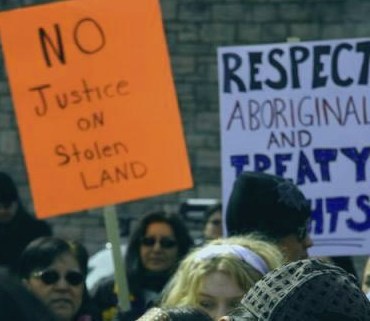 The Constitution does not
recognize the fiduciary obligations
of Canada as a country that was built through the colonial
seizure, occupation and exploitation of Indigenous lands and labour and
the
genocidal attempt to wipe them out as peoples. The fiduciary
obligations must ensure that the highest standard of living is
guaranteed to the Indigenous peoples and that all services are
provided to them at the highest possible level. Renewing on a
modern basis the relationships amongst sovereign Indigenous
nations, sovereign Quebec and sovereign Canada -- the sovereign
peoples as individuals and collectives -- is critical to the
renewal of Confederation and the modernization of the conditions
of life itself. The Constitution does not
recognize the fiduciary obligations
of Canada as a country that was built through the colonial
seizure, occupation and exploitation of Indigenous lands and labour and
the
genocidal attempt to wipe them out as peoples. The fiduciary
obligations must ensure that the highest standard of living is
guaranteed to the Indigenous peoples and that all services are
provided to them at the highest possible level. Renewing on a
modern basis the relationships amongst sovereign Indigenous
nations, sovereign Quebec and sovereign Canada -- the sovereign
peoples as individuals and collectives -- is critical to the
renewal of Confederation and the modernization of the conditions
of life itself.
The unprincipled pragmatic liberal line stands against
the
necessity to recognize the hereditary rights of the Indigenous
peoples. Prime Minister Justin Trudeau's senior Assistant Deputy
Minister for Treaties and Aboriginal Government Joe Wild
expressed this line on June 4. He was discussing ways to "breathe
new life" into the Canadian Constitution regarding Canada's
relations with First Nations and their sovereignty. Wild said,
"There is a notion of sovereignty that can still exist in a way
that doesn't threaten the fabric of the nation. There may be a
few areas where you've got to be a little bit careful, like
raising an army, the border of the country versus other
countries, but the rest of it? You could probably figure out ways
in which it kind of works out and it doesn't actually do anything
that would threaten the standing of Canada as Canada." Wild also
said his government will deal with each Indigenous community or
nation as a separate entity to try to reach an agreement with
each one of them.
 Wild's comments indicate
the continuation of an oppressive
colonial relation. The fight of Indigenous peoples for
sovereignty on their lands and in all decision-making does not
have to answer to a greater power that decides for them and
claims that it represents the fabric of the nation. Sovereignty
means that the Indigenous peoples decide and their relations with
Canada are relations between sovereign entities with the modern
relationship enshrined in the Constitution. The renewal of the
Constitution must eliminate any vestige of colonial relations and
the catch-phrases such as "collaborative approach" etc, which
mean in practice the continuation of the status quo. Wild's comments indicate
the continuation of an oppressive
colonial relation. The fight of Indigenous peoples for
sovereignty on their lands and in all decision-making does not
have to answer to a greater power that decides for them and
claims that it represents the fabric of the nation. Sovereignty
means that the Indigenous peoples decide and their relations with
Canada are relations between sovereign entities with the modern
relationship enshrined in the Constitution. The renewal of the
Constitution must eliminate any vestige of colonial relations and
the catch-phrases such as "collaborative approach" etc, which
mean in practice the continuation of the status quo.
The demand for a modern constitution is yet another
struggle
bringing Indigenous, Canadian and Quebec peoples into closer
united action for their rights. The struggle of all the peoples
is at heart one fight -- the fight for political and
constitutional renewal so that the rights of all can be
guaranteed in a modern constitution that recognizes, upholds and
guarantees the rights of all. The 19th century colonial racist
Canadian state and its retrogressive Constitution are blocking
the forward movement of society for which all the peoples as
individuals and collectives aspire.
 The time is now for women
and youth, together with all the
working people and their allies in other strata and classes
across Canada and Quebec to work together with the Indigenous
peoples for a profound renewal of the political arrangements in
the society and to deprive the authorities of their power to
deprive the people of their rights. The peoples themselves must
be empowered to take control of their economic, political and
social affairs. Constitutional and political renewal is a
precondition for true reconciliation amongst the Indigenous
peoples, Canada and Quebec. The time is now for women
and youth, together with all the
working people and their allies in other strata and classes
across Canada and Quebec to work together with the Indigenous
peoples for a profound renewal of the political arrangements in
the society and to deprive the authorities of their power to
deprive the people of their rights. The peoples themselves must
be empowered to take control of their economic, political and
social affairs. Constitutional and political renewal is a
precondition for true reconciliation amongst the Indigenous
peoples, Canada and Quebec.
The Constitution of 1982 Does Not Provide the Rights of
Citizens and Residents with a Guarantee
The recent history of Canada has witnessed an all-sided
offensive against the rights and freedoms of citizens and
residents in the name of "national security" and the "fight
against terror." This has occurred under the bankrupt notion of a
need to balance rights and security when in fact people have
rights by virtue of being human under all conditions and the
state is obligated to guarantee those rights.
 The Canadian Charter of
Rights and Freedoms was
incorporated into the patriated Constitution in 1982. The Charter
contains the provision of "reasonable limits [on rights and
freedoms] prescribed by law as can be demonstrably justified in a
free and democratic society." The Charter has fallen into
crisis and disrepute, as reasonable limits have been overtaken by
the arbitrary powers of the state known as police powers, which
dictate those rights the people may or may not have, just as Lord
Durham representing the colonial police power dictated in the
19th century. This has resulted in an endless arbitrary process
of criminalization of conscience and attacks against the
struggles of the people who oppose the anti-social offensive and
the war agenda of the ruling elite on the side of the U.S.
imperialists and U.S-led NATO. The Canadian Charter of
Rights and Freedoms was
incorporated into the patriated Constitution in 1982. The Charter
contains the provision of "reasonable limits [on rights and
freedoms] prescribed by law as can be demonstrably justified in a
free and democratic society." The Charter has fallen into
crisis and disrepute, as reasonable limits have been overtaken by
the arbitrary powers of the state known as police powers, which
dictate those rights the people may or may not have, just as Lord
Durham representing the colonial police power dictated in the
19th century. This has resulted in an endless arbitrary process
of criminalization of conscience and attacks against the
struggles of the people who oppose the anti-social offensive and
the war agenda of the ruling elite on the side of the U.S.
imperialists and U.S-led NATO.
Attacks on rights under the hoax of exceptional
circumstances
have become the norm, and communities such as the Muslim
community are being profiled and targeted with a vengeance and
without a right to recourse. The absence of a constitution that
prescribes inalienable rights and makes them enforceable and
justiciable is acutely felt all across the country.
Furthermore, the arrangements at the base of
Confederation
are being destroyed as governments at all levels, whether
federal, provincial or municipal, have been taken over by global
private monopoly interests. They have become instruments of
decisions made on a supranational basis.
The ruling elite no longer consider the old
arrangements of
power-sharing between the federal and provincial governments useful for
the drive of the most powerful global monopolies. They
do not recognize any jurisdiction or limitation on their monopoly
right and striving for domination and empire-building. The
contradictions over federal/provincial power-sharing agreements
have degenerated into dogfights amongst governments serving
definite global monopoly interests. This can be readily seen in
the fight over energy, health care payment transfers, monies for
infrastructure spending and many other issues.
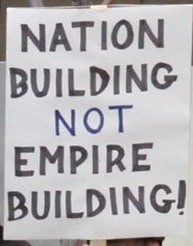 The need to renew the
Constitution to vest sovereignty in the
people and guarantee their rights as the basis of Canadian
sovereignty has never been greater. Political and constitutional
renewal, far from being outdated or what the ruling elite call "a
divisive issue," is central to opening the path to the progress of
society. In this regard, the Canadian working class and other
social classes and strata should seize the occasion of the
preparations for the 150th anniversary of Confederation to
examine the evolution of the democratic institutions in Canada,
the interests they serve, in what direction they are being taken
and what needs to be done to give form and content to the
people's aspirations for sovereignty, empowerment and
enlightenment, and the right to decide and control those
political, economic and social affairs that affect their lives.
This initiative is most timely and necessary to chart our destiny
in a way that is beneficial to the people. The need to renew the
Constitution to vest sovereignty in the
people and guarantee their rights as the basis of Canadian
sovereignty has never been greater. Political and constitutional
renewal, far from being outdated or what the ruling elite call "a
divisive issue," is central to opening the path to the progress of
society. In this regard, the Canadian working class and other
social classes and strata should seize the occasion of the
preparations for the 150th anniversary of Confederation to
examine the evolution of the democratic institutions in Canada,
the interests they serve, in what direction they are being taken
and what needs to be done to give form and content to the
people's aspirations for sovereignty, empowerment and
enlightenment, and the right to decide and control those
political, economic and social affairs that affect their lives.
This initiative is most timely and necessary to chart our destiny
in a way that is beneficial to the people.
Constitutions and constitutional matters must not be a
monopoly of a ruling elite that use them for their own narrow
self-serving private interests. They belong to the people
fighting to defend their rights. Canadians want to enshrine and
codify in a constitution the modern definitions to which they
aspire and which are in conformity with the concrete conditions.
The fight to renew Confederation on a modern basis is an
instrument in the hands of the people to further the public
interest, open a path forward and block the arbitrariness,
backwardness, anarchy, violence and wars that the ruling elite
have unleashed.
Let us put the vestiges of 19th century empire-building
in
the dustbin of history and organize for a modern constitution and
a free and equal union of sovereign peoples whose rights are
recognized and guaranteed.

North American Leaders' Summit
Activists Hold Vigorous Picket
Against Summit Agenda
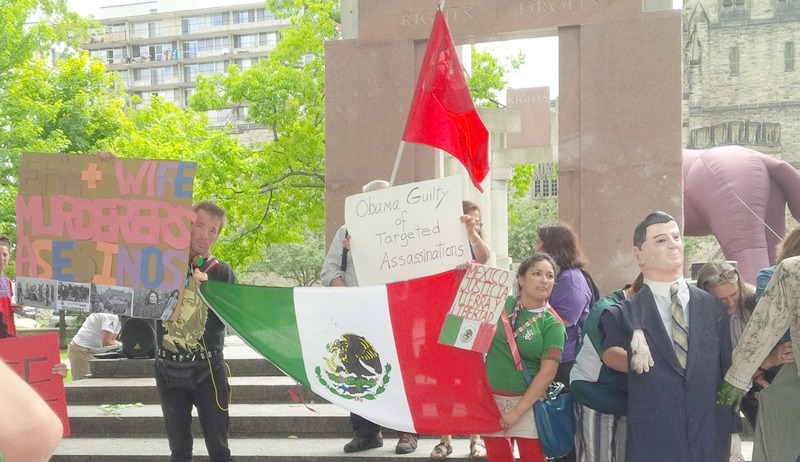
Activists from Ottawa, Gatineau and Montreal gathered at
the Human Rights Monument in Ottawa on June 29 to protest the
summit of "North American Leaders."[1]
The summit came with an unprecedented level of
police forces with all of downtown Ottawa on "security lockdown."
Demonstrators rejected the plans of the leaders of Canada, the
U.S. and Mexico to exploit the land, resources and labour of the
three countries in the service of North American monopolies.
The Communist Party of Canada (Marxist-Leninist) issued
a statement on the occasion which was distributed throughout the picket
and called on Canadians to say No! to Fortress North America and the
war plans of the leaders (see below). Activists from CPC(M-L) denounced
the U.S. imperialist doctrine of targeted assassinations espoused by
President Barack Obama and Canada's support for U.S. striving for
domination.
The picket spoke out against neo-liberal free trade
agreements such as the North American Free Trade Agreement (NAFTA), the
Trans-Pacific Partnership (TPP) and the Canada-European Union
Comprehensive Economic and Trade Agreement (CETA). Protestors from
Montreal with the Réseau québécois sur
l'intégration continentale presented the demand for an end to
the government's austerity measures and to take action on climate
change. The Council of Canadians and Canadian Labour Congress joined to
call for Canada to not sign the TPP. Participants brought a 10-metre
tall inflatable Trojan horse to symbolize the destructive effects of
the TPP once ratified.
A militant contingent of Canadians demonstrated in
support of
the people of Mexico and said loud and clear that Mexican
President Enrique Peña Nieto was not welcome in Canada and must
be held to account for the vicious oppression and police violence
of the state against the Mexican people. Activists pointed out
that we can never forget the numerous violations of human rights
in Mexico. Those responsible for the mass graves and the
disappearances of hundreds of social activists must be found and
prosecuted, they said.
From the Human Rights Monument, activists continued to
the
National Gallery of Canada where the three leaders were meeting,
to ensure the criminal agenda of the summit was opposed.
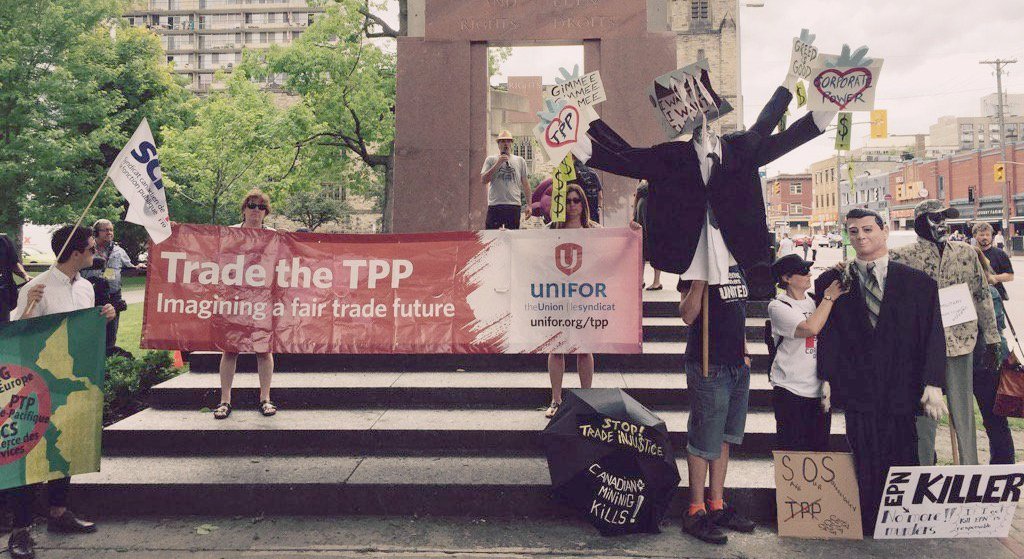

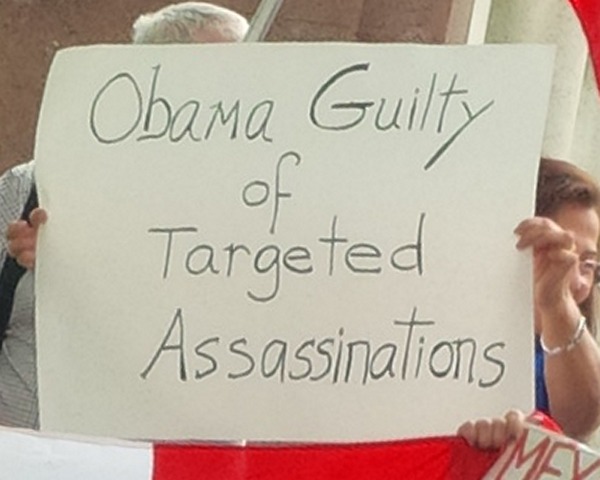 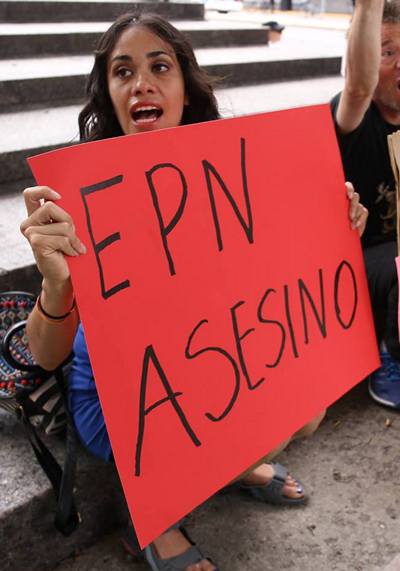
 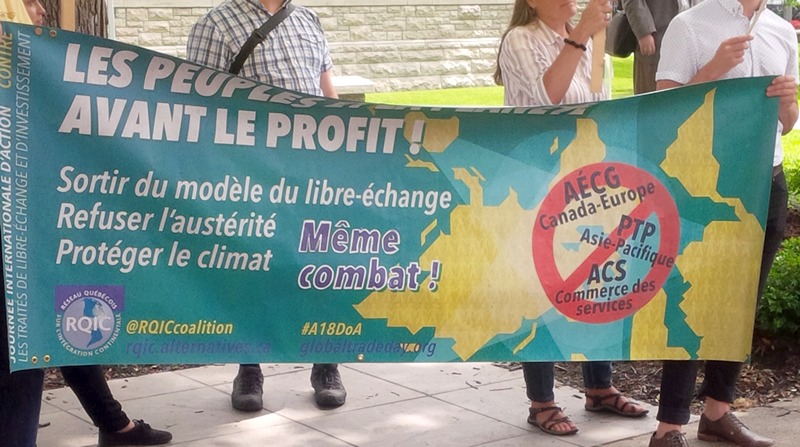

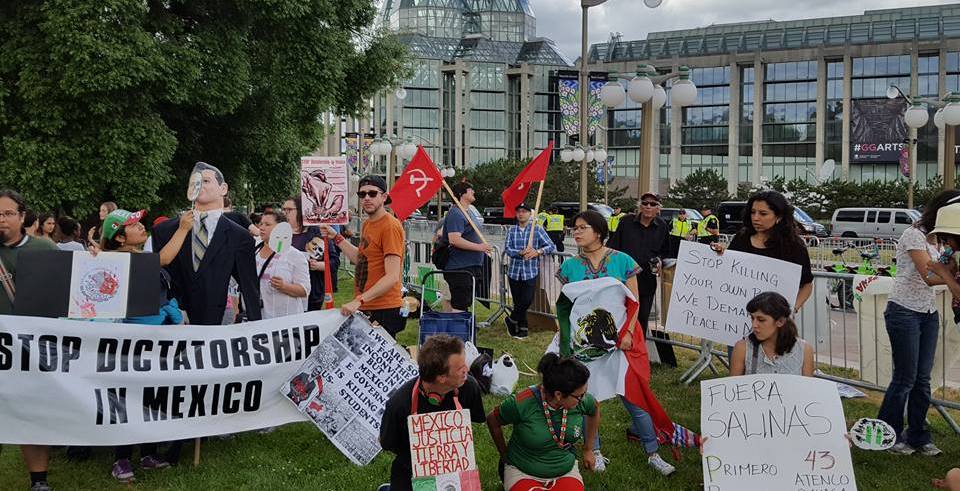
Note
1. The main agenda of the
leaders'
summits since their start in 2005 has been to promote full continental
integration to serve the needs of North American monopoly
corporations and to back the U.S. imperialist striving for world
domination. A task force report issued by the U.S. Council on
Foreign Relations in October 2014 outlined the agenda of the U.S.
political elite. Titled North America: Time for
a New Focus, the report asserts that "elevating and
prioritizing the US-Canada-Mexico relationships offers the best
opportunities for strengthening the United States and its place
in the world."

New Phase to Entrench the United States of
North American
Monopolies
- Enver Villamizar -
The
North
American
Leaders'
Summit
took
place
in
Ottawa
on
June
29. The Summit
was preceded by an official state visit to Canada of Mexican President
Enrique Peña Nieto from June 27 to 28 and followed by an
addresses by
Prime Minister Justin Trudeau and U.S. President Barack Obama in the
House of Commons to MPs, Senators and invited guests. As announced
prior to the Summit by various officials, the three days of events were
used to make public "more than one process designed to tighten
long-term co-operation over multiple areas."
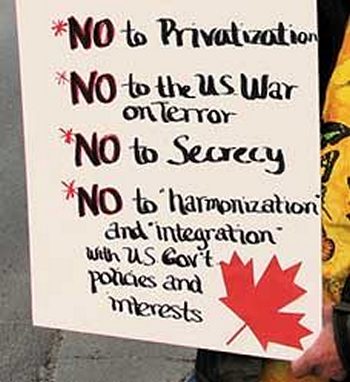 The official
statement of the Summit only highlighted cooperation in the field of
clean energy and reduction of emissions with emphasis on a commitment
by the three leaders to reach the goal of 50 per cent clean energy
production by 2025. This goal is for the three countries as a single
entity rather than for each country individually. According to
reports, Canada already meets this target. This illustrates the manner
in which important decisions concerning the environment have been
usurped by this supranational imperialist body, making a mockery of the
prerogatives of national legislatures and governments. Targets are set
by a trilateral institution called the North American Leaders' Summit,
a name which itself is misleading since it is not a "trilateral" but a
unilateral supranational institution established by the most powerful
U.S. imperialist monopolies that have seized control of the states of
the three countries. These decisions are said to be regulated by each
country as if the national entities exercise any control whatsoever
over the regulations. It is suggested that there is no choice on this
because the individual countries have to abide by international
commitments and ensure "North American" competitiveness. The official
statement of the Summit only highlighted cooperation in the field of
clean energy and reduction of emissions with emphasis on a commitment
by the three leaders to reach the goal of 50 per cent clean energy
production by 2025. This goal is for the three countries as a single
entity rather than for each country individually. According to
reports, Canada already meets this target. This illustrates the manner
in which important decisions concerning the environment have been
usurped by this supranational imperialist body, making a mockery of the
prerogatives of national legislatures and governments. Targets are set
by a trilateral institution called the North American Leaders' Summit,
a name which itself is misleading since it is not a "trilateral" but a
unilateral supranational institution established by the most powerful
U.S. imperialist monopolies that have seized control of the states of
the three countries. These decisions are said to be regulated by each
country as if the national entities exercise any control whatsoever
over the regulations. It is suggested that there is no choice on this
because the individual countries have to abide by international
commitments and ensure "North American" competitiveness.
In
addition
to
the
official
statement
issued
by
the Summit, the Prime
Minister's Office released a number of fact sheets which outline a
broad array of new arrangements that have been worked out and set in
motion among the three executives. Most of these new agreements have
been reached since the election of the Trudeau government. Since
Trudeau's election there have been high
level meetings of North American Foreign Affairs, Energy and Defence
Ministers to put these various arrangements in place.
The
new
measures
include
embedding
Canadian
and
Mexican
customs
officials
in
U.S.
Customs headquarters to pre-screen cargo; mutual
recognition of "trusted trader programs" and other "trusted traveler"
arrangements in which those who agree to be pre-screened by U.S.
Homeland Security can get expedited security clearances at airports and
other ports (while those who do not, are not "trusted"); a pilot
project
to have security agencies in all three countries track down "foreign
fugitives;" the launch of the "2016 North American Competitiveness Work
Plan" including "fourteen new initiatives that will reduce costs for
business, improve supply chain efficiency, advance innovation and
economic development, and engage stakeholders through consultation and
outreach;" an initiative to have the RCMP work more closely with
Mexican federal police under the guise of fighting transnational crime;
and a "North American Caucus" on peacekeeping operations.
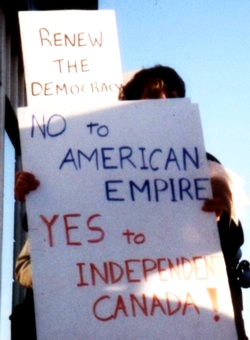 In all cases the
approach to matters of great concern to the peoples of Canada, the
United States and Mexico completely excludes the peoples themselves.
Under the hoax that foreign affairs are an executive prerogative, the
three countries have been integrated into a new state of North American
monopolies which has been permitted by a cartel party system that keeps
quiet about what is going on and facilitates such things taking place.
It not only shows the necessity for the working class to inform
themselves of what is taking place and the consequences of the new
measures, but also to speak out at every opportunity. A crucial matter
for discussion is that the existing democratic institutions permit
decisions of great importance to be made behind the backs of the
people, violating the demand of the people at this time to exercise
control over the decision-making power. In all cases the
approach to matters of great concern to the peoples of Canada, the
United States and Mexico completely excludes the peoples themselves.
Under the hoax that foreign affairs are an executive prerogative, the
three countries have been integrated into a new state of North American
monopolies which has been permitted by a cartel party system that keeps
quiet about what is going on and facilitates such things taking place.
It not only shows the necessity for the working class to inform
themselves of what is taking place and the consequences of the new
measures, but also to speak out at every opportunity. A crucial matter
for discussion is that the existing democratic institutions permit
decisions of great importance to be made behind the backs of the
people, violating the demand of the people at this time to exercise
control over the decision-making power.
The
Leaders'
Summit
was
held
in
Ottawa
under
the
auspices
of
the
Trudeau government,
during the last days of the Obama presidency, at a time when the U.S.
imperialists are calling for the election of a war president "to make
the U.S. great again." It includes the participation of a man who has
usurped power in Mexico and who, besides all the other crimes being
committed in Mexico, is presiding over the wanton killings of
courageous teachers standing up for the rights of the Mexican people.
The main thrust of the Summit was to establish new arrangements for
"governance and co-operation" between the executives of the three
countries as a way to politicize private interests and further entrench
the rule of the monopolies over all matters of importance in North
America. This follows the previous phase of nation-wrecking which
emphasized bi-lateral arrangements between Canada and the U.S. and U.S.
and Mexico separately. The election commitment of the Trudeau Liberals
to lift the Mexican visa requirement and host this new Leaders' Summit
with the United States and Mexico were required to create the
conditions for this current phase of annexation.
During the election, the Liberals presented themselves
as "anti-Harper" -- that is, that they would not continue down the same
road. It is now even more clear that the political and economic elite
embraced the Liberals precisely to ensure that on the eve of the U.S.
presidential election, Canada plays a "constructive role" to ensure
that North American monopolies are number one on world markets and
nothing interferes with the U.S. imperialist plans for world domination.
The
task
of
the
ruling
elite
in
all
three
countries
is
to
eliminate any blocks to
monopoly right on a continental basis. It must not pass! All out for
democratic renewal to vest sovereignty in the people! Our future lies
in the defence of the rights of all!
(TML
Weekly
will report more on the
new
arrangements being put in place and their significance in future issues.)

Say No! to Fortress North America!
No to War Preparations and
Monopoly Rule!
Obama and Peña Nieto Go
Home!
The Communist Party of Canada (Marxist-Leninist) calls
on Canadians and
Quebeckers to firmly oppose the presence in Canada of U.S. war
president Barack Obama and his Mexican counterpart Enrique Peña
Nieto. Go all out to oppose the 10th North American Leaders'
Neo-Liberal War Summit taking place in Ottawa on June 29. The
Summit aims to disarm the resistance of the people and step up
the criminal activities that put all the human, material and
natural resources of the peoples of Canada, the U.S. and Mexico
at the disposal of the most powerful monopolies, concentrate
their power and privileges on a supranational basis, destroy the
anti-war public opinion of the people and mobilize them behind
the criminal U.S.-led wars of aggression and occupation and
Obama's politics of drone assassination.
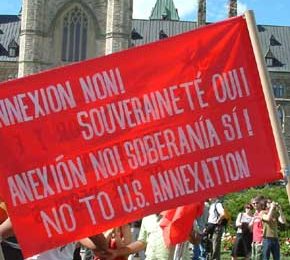 Media reports are crowing
that for the first time since
the
Summits began in 2005, all three governments "are ruled by
centrist parties." The financial oligarchs are euphoric that they
have such governments that can pull off war preparations,
neo-liberal free trade agreements and an unprecedented sellout of
the people under the noses of the people themselves.[1] This sentiment was expressed
blithely by Canada's Minister of Environment Catherine McKenna
when she said, "It's a great message to the world that we're
working together, we believe in trade, we have progressive
governments." Media reports are crowing
that for the first time since
the
Summits began in 2005, all three governments "are ruled by
centrist parties." The financial oligarchs are euphoric that they
have such governments that can pull off war preparations,
neo-liberal free trade agreements and an unprecedented sellout of
the people under the noses of the people themselves.[1] This sentiment was expressed
blithely by Canada's Minister of Environment Catherine McKenna
when she said, "It's a great message to the world that we're
working together, we believe in trade, we have progressive
governments."
At a time when Canadians are organizing to intensify
their
opposition to U.S.-led wars and neo-liberal free trade including
NAFTA, the Trans-Pacific Partnership and CETA, Justin Trudeau,
Barack Obama and Enrique Peña Nieto have the arrogance to put on
their agenda the creation of "a more integrated, sustainable and
globally-competitive North American economy" and sanction Obama's
politics of endless war and drone assassination. Leaks of the
secret agenda reveal talk of a "union" of Fortress North America
under the domination of the monopolies and to do everything
possible to counter any contagion from Brexit and aspiration of
the peoples everywhere for their own independent economies and
politics under their control.
The Canadian American Business Council comprised of
some of
the biggest private monopolies in Canada and the U.S. has called
for the leaders to strike a three-country "cabinet group," a new
political executive for the United States of North American
Monopolies to deprive the people of any possibility to control
those affairs that affect their lives. This Fortress North
America Cabinet would be an extension of existing mechanisms
joining the ruling elite of Canada and the U.S., the High Level
Economic Dialogue between the U.S. and Mexico, and the
Canada-Mexico High Level Strategic Dialogue announced on June
28.[2]
Media report that "an official in one of the countries
said
the leaders will announce more than one process designed to
tighten long-term cooperation over multiple areas." In other
words, behind the backs of the people arrangements are being put
in place whereby decision-making is further concentrated in the
hands of a trilateral executive where the buck stops with the
U.S. and the decisions they take are imposed on national
legislatures and the people. The further concentration of
decision-making power in a supranational executive led by U.S.
imperialism makes a mockery of the Liberals' pledge to restore
the credibility of the democratic institutions, whether through
electoral reform or other means.
 These matters are a serious
concern to Canadians. The
Liberal
government is accelerating the restructuring of the state to pay
the rich, further disempowering the people and increasing
Canada's participation in U.S. imperialist war preparations. The
neo-liberal war summit of Fortress North America points to an
existential crisis facing Canada and highlights the grave dangers
for the Canadian people should the U.S. imperialists succeed in
embroiling Canada in missile defence, nuclear blackmail, its
politics of assassination and stepped up preparations for world
war. These matters are a serious
concern to Canadians. The
Liberal
government is accelerating the restructuring of the state to pay
the rich, further disempowering the people and increasing
Canada's participation in U.S. imperialist war preparations. The
neo-liberal war summit of Fortress North America points to an
existential crisis facing Canada and highlights the grave dangers
for the Canadian people should the U.S. imperialists succeed in
embroiling Canada in missile defence, nuclear blackmail, its
politics of assassination and stepped up preparations for world
war.
The "processes for cooperation" are being installed in
the
twilight of the Obama war presidency precisely because the U.S.
ruling elite are organizing for a Clinton war presidency to carry
forward and drastically expand U.S. aggression in Asia, Africa
and Latin America.
In this regard, war president Obama will address a
special
session of the House of Commons with MPs and Senators present on
June 29 to give the final word on the meetings most likely in an
atmosphere of blind euphoria. Before the House adjourned on June
17 for its summer break, the Liberal government introduced two
bills to further integrate Canada with the U.S. national security
apparatus in information sharing and border pre-clearance and set
the stage for the next phase of "cooperation."[3]
The Liberal government's actions
and this neo-liberal war summit underscore the serious dangers for
the people. Organize to bring into being a pro-social alternative
to neo-liberal globalization and war!
Say No! to Fortress North America!
Sovereignty, Yes!
Annexation, No! Down with Obama's Politics of Drone
Assassination! Oppose U.S. Preparations to Install a Clinton War
President! Canada Needs an Anti-War Government! One Humanity, One
Struggle!
Notes
1. This is the first summit to
be held
since February 2014 in Toluca, Mexico. The summits began in 2005
as the Security and Prosperity Partnership of North America, a
name that was discarded after the meetings were met with the
militant resistance of working people in all three countries,
including at Montebello, Quebec in August 2007.
2. The Canadian American Business
Council (CABC) promotes strengthening monopoly right throughout
North America by attacking the public authority and removing and
"harmonizing" national regulations and standards that limit in
any way the exercise of control by the biggest monopolies. It
also promotes integration on security and defence matters.
Its Board is made up of main owners and executives of
Air
Canada, Barrick Gold, Baxter Corporation, Bennett Jones,
Bombardier, Borden Ladner Gervais, Campbell's Soup Company,
Canadian National Railway, Capitol Hill Consulting Group, The
Coca-Cola Company, Contextere, Dickstein Shapiro, Enbridge,
Energy Equipment and Infrastructure Alliance, ExxonMobil,
Facebook, Ford Motor Company, General Electric, Google,
Harley-Davidson Canada, Johnson&Johnson, Lockheed Martin,
MasterCard, Motion Picture Association-Canada, Revolution
Organics, Rio Tinto Canada, Shell, Spectra Energy, TD Bank Group,
and UPS.
The CABC Advisory Board is chaired by the current
Canadian
Ambassador to the U.S. and is composed of all former Ambassadors
to Canada and the U.S., as well as former Congressman John
LaFalce, former Senator Jack Austin, P.C., Q.C., and former
Minister Barbara McDougall, P.C., O.C.
3. Bills C-21, An Act to amend
the
Customs Act and C-23, An Act respecting the preclearance of
persons and goods in Canada and the United States (Preclearance
Act, 2016).

Condemn Mexican Government's
Criminal Repression of Teachers
and Students!
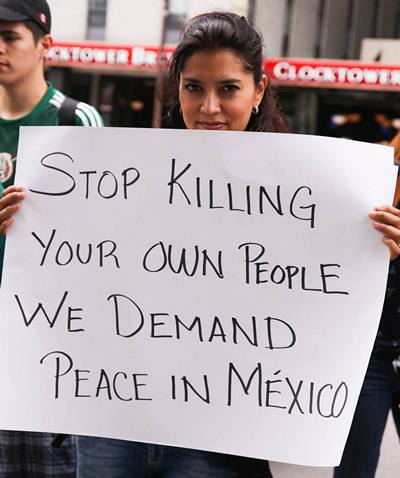  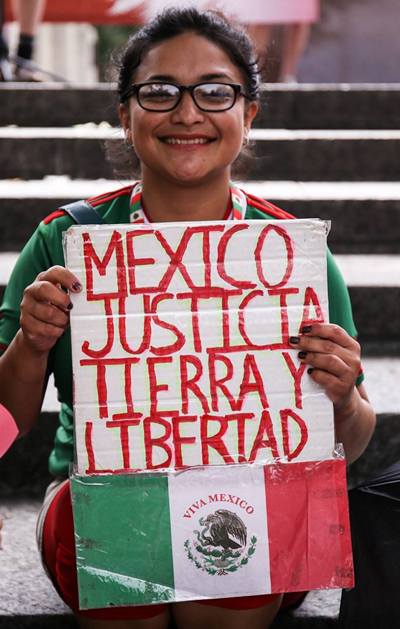
Ottawa, June 29, 2016
The Communist Party of Canada
(Marxist-Leninist) condemns the ongoing state terror against teachers
and students
in Mexico as well as the support and open arms of the Trudeau
Liberal government and Couillard Liberal government in Quebec for
Mexican President Enrique Peña Nieto during his state
visit to Canada June 27 to 28.
As many as 12 striking teachers and their supporters
were shot to death on June 19 by federal and state police near the town
of Nochixtlan, northwest of Oaxaca City, Mexico as they protested the
government's neo-liberal education reforms. Up to 100 more were injured
and arrested. Instead of
negotiating with the teachers' union and respecting their rights
the government had earlier jailed several of its leaders and
announced its intention to fire several thousand teachers for
participating in the strike actions. A number of teachers are now
being held in maximum security prisons. The harsh repression
against teachers, particularly those from Indigenous communities
is meant as an example to the entire Mexican people if they dare
resist.
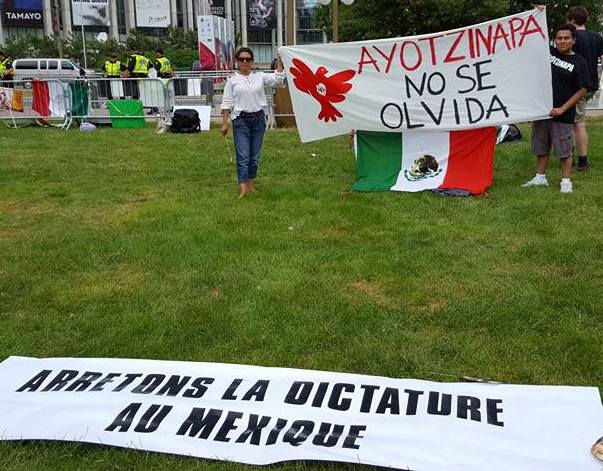 The latest killings follow
the state-organized
disappearance and presumed murder in 2014 of 43 Mexican students,
many of them student teachers at the Ayotzinapa normal school in
the state of Guerrero. Two years later, no justice has been
provided, and far from the government being held to account,
disappearances continue with impunity. The latest killings follow
the state-organized
disappearance and presumed murder in 2014 of 43 Mexican students,
many of them student teachers at the Ayotzinapa normal school in
the state of Guerrero. Two years later, no justice has been
provided, and far from the government being held to account,
disappearances continue with impunity.
Since May, teachers, education workers, students and
their
families have been waging ongoing strike actions to oppose the
government's reforms in education. The reforms specifically
target teachers and education workers' working conditions and the
very existence of their unions as a block to restructuring the
Mexican education system on a neo-liberal basis. The reforms are
part of a broad restructuring of the Mexican state being
undertaken by the Peña Nieto government which is opening
more of the country's public assets, in particular its energy
resources and roads, to privatization.
The Mexican working class and people are standing with
their
teachers. The killings and repression have sparked massive
demonstrations by students, parents, the country's doctors and
others in support of the teachers. Tens of thousands marched in
Mexico City on June 27 led by the Coordinadora Nacional de
Trabajadores de la Educación (CNTE) teachers' unions. They
are calling on the government of President Enrique Peña
Nieto to stop its brutal attacks and to engage in dialogue with
the teachers over their proposals for a new model of education
that meets the needs of their students and Mexican society
instead of the private business interests driving the
government's education reforms. In Canada, teachers' unions such
as the BC Teachers' Federation and Ontario Secondary School
Teachers' Federation have strongly denounced the repression and
called for justice and the release of political prisoners.
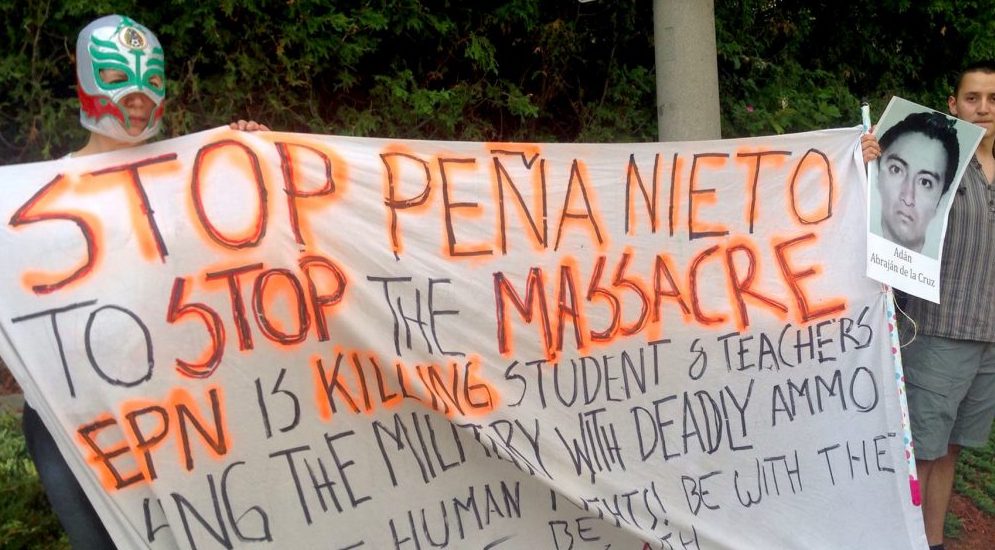
Protest at the entrance to Casa Loma in Toronto, where an
official
dinner was held for President Peña Nieto on June 27 as
part of his state visit prior to the North American Leaders'
Summit. A large contingent of Canadians denounced his government's
actions of giving impunity to those who perpetrate massacres of
students and teachers, as his motorcade entered the grounds.
It is telling that under such circumstances Canadian
Prime
Minister Trudeau, whose claim to fame during the federal election
was being a former occasional teacher himself, will sign
agreements with President Peña Nieto during his state
visit on "educational exchanges," and share "best practices" on
what media described as "ending the social isolation and
exploitation of Indigenous people in both countries." Canada is
also offering "intelligence and training" to Mexico's murderous
security agencies under the guise of combating drug violence.
In this way, the Canadian government is assisting to
whitewash brutal violations of human rights of workers and
Indigenous peoples in Mexico the same way it arrogantly praises
its own human rights record to divert from problems facing the
people.
This is also the meaning of Quebec Premier Couillard's
statement on June 27 that Mexico is "moving in the right
direction" as concerns human rights. Couillard called for support
for the "very ambitious program of reforms" undertaken by
Peña Nieto. Trudeau, for his part, said, "It is important
that we move forward towards greater respect and defence of human
rights, and that's... part of the things that friends work
together on well... Obviously, as a teacher, I had a good
conversation with the president on this..."
CPC(M-L) pledges its support for the fighting workers
and
people of Mexico and calls on Canadians and Quebeckers to not
permit the murder of workers and Indigenous peoples to be covered
up by those who claim to speak in their name.
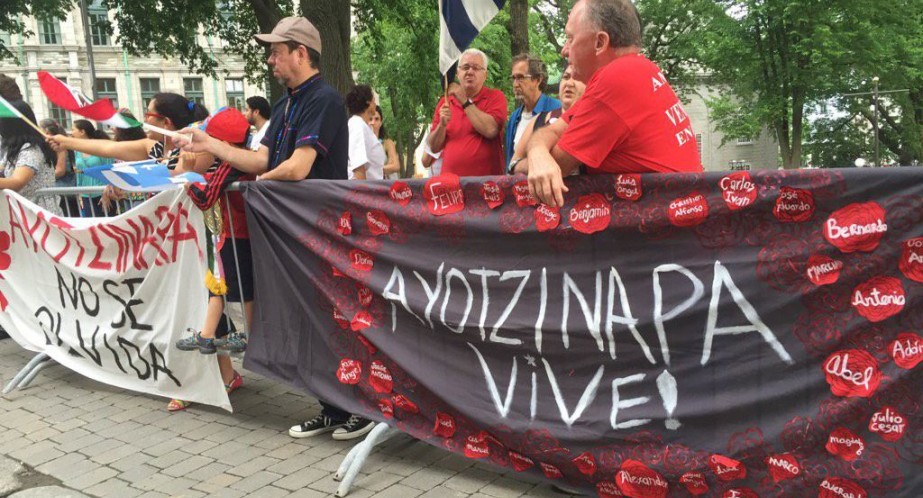
June 26 protest against Peña Nieto in Quebec City condemning the
disappearance of 43 students in 2014.

Say No! to Canada Post's Attacks on
Workers and
the Public Interest
Postal Workers on the Front Lines Defending
Their
Rights and
the Public Post Office
 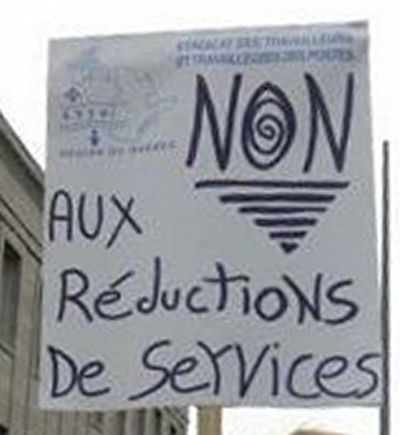
The Canadian Union of Postal Workers (CUPW) announced
on
July 2 that it would not file a 72-hour strike notice that day,
meaning that the workers will not take strike action before Thursday,
July 7. This is despite the fact that as of July 2
postal workers have been in a legal position to strike against
the Canada Post Corporation, while Canada Post is permitted to lock out
the workers, shutting down the post office
and depriving postal workers of their livelihoods to force them
to accept the harsh concessions demanded by the company.
On June 29, CUPW informed that Canada Post refused to
extend
the July 2 lockout deadline for two weeks to allow negotiations
to continue. During the last collective agreement negotiations
between Canada Post and CUPW in 2011, the workers were locked out
with no notice and subsequently ordered back to work through a law
passed by the Conservative government. Canadians are concerned
that Canada Post will do the same on July 2. They have been
bombarded by monopoly media announcements warning them to prepare
for an interruption in mail service.
Postal workers across the country voted throughout June
to
authorize the union to call a strike "to achieve our demands,
stop the employer's rollbacks and improve service to the public."
Urban postal workers voted 94.19 per cent in favour and rural and
suburban mail carriers voted 91.26 per cent in favour.
The contract between Canada Post and the Canadian Union
of
Postal Workers expired on January 31, 2016 and right from the
first discussions between the two parties to work out a new
contract the corporation has demanded major rollbacks. Its
position has not changed since that time and referring to the
process as "negotiations" is a misnomer because no negotiations
worthy of the name have taken place.
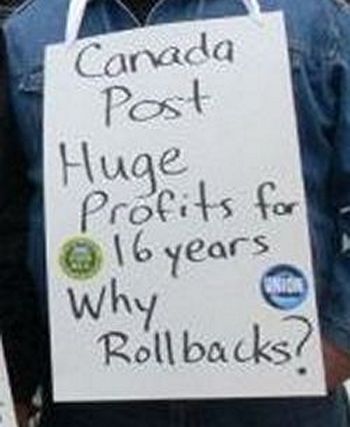
On January 27, 2016, when Canada Post presented their
"opening remarks and proposals," they listed a series of
demands for significant rollbacks in job security, working
conditions and benefits, as well as drastic changes to the
pension plan. Their remarks also contained clear threats against
the union and all postal workers. A note at the end of the
corporation's presentation said:
"While we possess a sincere desire to reach a tentative
agreement expeditiously, we must also ensure that the corporation's
interests are protected. The corporation will not
sit idly by if its business declines or is threatened or
negatively impacted by pressure tactics or work disruptions; we
therefore reserve the right to pursue different solutions to the
issues that are brought forward. Also, while we will tentatively
agree to solutions on individual issues, these won't crystallize
until a tentative agreement on an overall settlement is
reached."
Even before "negotiations" could begin, the corporation
was
threatening the union with actions outside the negotiations
process if the union did not capitulate. The arrogance of the
corporation exposes their intention to continue robbing postal
workers of hard-won rights and benefits with "different
solutions," like lock-outs, legislation and blackmail, as has
been the practice in the past. What can "negotiations" possibly
mean when such threats are bandied about right from the
start?
Since the first meeting, Canada Post has maintained all
its demands for rollbacks and has refused to consider any of the
demands of the workers for improvements. At the first opportunity
provided by the Canada Labour Code, the corporation ended
negotiations by applying for the conciliation stage. This is a
farce since the intention of conciliation is to assist
two sides who are actually engaged in negotiations and need a
third party to reach a final agreement.
This clearly does not apply. There has been no movement
by
the corporation on any of its major rollbacks, so the request for
conciliation is a move to end the negotiations, period, and to
use the threat of lockout against the workers.
 The demands of the
corporation for concessions are a
serious
attack on postal workers' rights on wide-ranging issues that will
affect all classifications. These include: The demands of the
corporation for concessions are a
serious
attack on postal workers' rights on wide-ranging issues that will
affect all classifications. These include:
- attacks on defined-benefit pensions;
- increased
premiums for the heath care plan;
- reduced annual leave (vacation leave);
- elimination of pre-retirement leave;
- attacks on seniority rights;
- more part-time work and elimination of full-time ratio;
- temporary employees hired to deliver parcels on weekends;
- increased length of workday for Group 3 workers (technical and
general labourers);
- elimination of overtime bypass penalty;
- elimination of paid lunch periods;
- elimination of present contract clause protecting the remaining 493
Corporate Offices, which would permit Canada Post to close remaining
retail facilities; and many others.
Canada Post is going to great lengths to use threats
and
intimidation against postal workers at every step. Jeopardizing
their business, corporation spokespersons recently warned major
customers to prepare for service disruptions and to make
contingency plans. In other words, they are telling their
customers to use other, private mailers while the corporation
itself plans to create service disruptions.
Faced
with
the
neo-liberal
agenda
of
the
Trudeau
Liberals,
postal
workers
are organizing to defend themselves against the attack on their
wages and benefits and the right to have a say in their working
conditions. Postal workers are actively mobilizing all Canadians to
defend the Public Post Office. Organizers are also working full-time
nationally and in each region to get maximum involvement in their
campaign for Canadians to submit their views to the "Task Force" that
is reviewing Canada Post demanding restoration of home-delivery and
that Canada Post expand services like Postal Banking and other
innovative proposals to strengthen a true public Post Office.

Trudeau Government's Agenda for
Rollbacks and
Privatization
- Louis Lang -
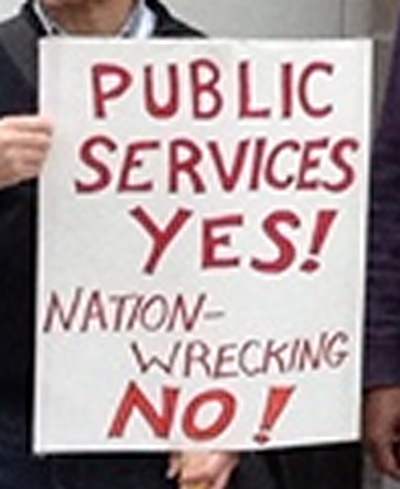 Postal workers know from
their experience that
negotiations with the Crown corporation Canada Post are in fact
negotiations with the federal cabinet and this round is no
different. To support the vicious attack of the corporation on
the wages, working conditions and benefits of postal workers, the
Trudeau government has launched a diversionary "national
consultation" on the mandate of Canada Post. Although the
government claims that this review will give all Canadians a
chance to be consulted about the kind of post office they want,
it is clear that this exercise is timed to put further pressure
on the workers to accept severe rollbacks. Postal workers know from
their experience that
negotiations with the Crown corporation Canada Post are in fact
negotiations with the federal cabinet and this round is no
different. To support the vicious attack of the corporation on
the wages, working conditions and benefits of postal workers, the
Trudeau government has launched a diversionary "national
consultation" on the mandate of Canada Post. Although the
government claims that this review will give all Canadians a
chance to be consulted about the kind of post office they want,
it is clear that this exercise is timed to put further pressure
on the workers to accept severe rollbacks.
The review began in May 2016 with a task force
appointed to
review what it defines as the issues and produce a discussion
paper by September 2016. The "Task Force" will facilitate the
involvement of monopoly corporations like UPS, FedEx, Pitney
Bowes and others to step up their campaign to push for more
privatization and deregulation of Canada Post. From September to
November there will be "Consultations with Canadians," followed by a
report tabled in Parliament in December 2016 and in Spring 2017
the "government announces decision."
It is the height of hypocrisy for the Trudeau
government to claim that in this review "privatization is not on the
table." The review has neither an explicit mandate to oppose
privatization nor is it to be based on the principle of strengthening
and defending the public post office. The mandate according to the
government is "to ensure Canadians receive quality service from Canada
Post at a reasonable price." In fact the privatization and deregulation
of Canada Post has been on the agenda of all governments from Mulroney
to Chrétien to Martin when plans were put in place for the
massive closure of postal outlets across the country and the turnover
of the lucrative retail business of Canada Post to private giants like
Shoppers Drug Mart and others. These measures were continued and
accelerated under the Harper Conservatives who deregulated outgoing
foreign mail, giving away Canada Post's exclusive privilege to handle
this mail to large private monopoly mailers. This was done with the
stroke of a pen through a clause hidden in one of Harper's massive
omnibus bills that was never discussed in Parliament or in the monopoly
media.
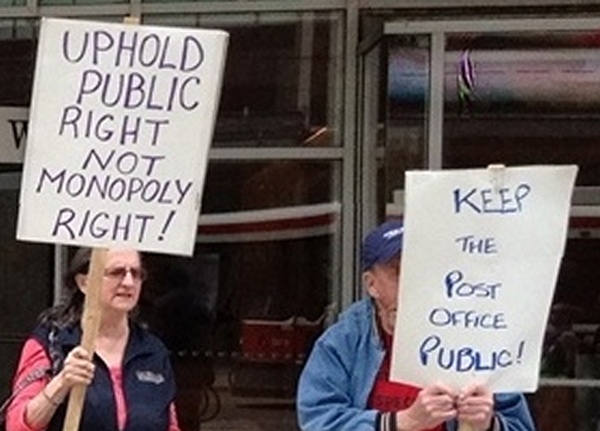 Harper also appointed as
head of Canada
Post Deepak Chopra, a
past President of Pitney Bowes in Canada, a major
international monopoly corporation in the mailing industry. Chopra was
appointed to continue the destruction of the public
post office by a full-scale centralization of mail processing
into a handful of large plants across the country. This led to
the closure of important processing plants in Quebec City,
Windsor, London and many other centres. The goal of this plan is
to reduce mail processing to four or five main plants across the
country, leading to the displacement of thousands of workers
along with severe reductions of the workforce. Harper also appointed as
head of Canada
Post Deepak Chopra, a
past President of Pitney Bowes in Canada, a major
international monopoly corporation in the mailing industry. Chopra was
appointed to continue the destruction of the public
post office by a full-scale centralization of mail processing
into a handful of large plants across the country. This led to
the closure of important processing plants in Quebec City,
Windsor, London and many other centres. The goal of this plan is
to reduce mail processing to four or five main plants across the
country, leading to the displacement of thousands of workers
along with severe reductions of the workforce.
The plans to stop home delivery and eliminate 8,000
letter
carrier and mail service courier positions were also hatched by
Chopra under the direction of the Harper government. While Justin
Trudeau promised to stop the elimination of home delivery during
the last election, he has washed his hands of the need to restore
home delivery to millions of Canadians by pretending to have a
nation-wide consultation with the very people whose services have
been cut.
This consultation, like others Trudeau initiated
since he
was elected, has fraud written all over it. The fundamental
question which Canadians have been raising for many years is that
they want a public Post Office. This issue is not even being
addressed by the newly appointed "Task Force." Instead people are
being presented with a fait accompli that the government's
policies, on which no one was consulted, have resulted in
the elimination of services, cutting of positions, ongoing
privatization and deregulation of postal services that have led to a
financial crisis in the post office. We are told that now Canada
Post is unable to fulfill its obligation to provide universal
postal service to all Canadians and the pension plans are in
peril. But instead of admitting that it is the neo-liberal drive
to privatize and hand over the most lucrative parts of postal
services to private monopolies which is at the heart of the
crisis, the government and Canada Post are blaming the workers
and demanding that the workers give up all their rights to decent
wages and any control over their working conditions.
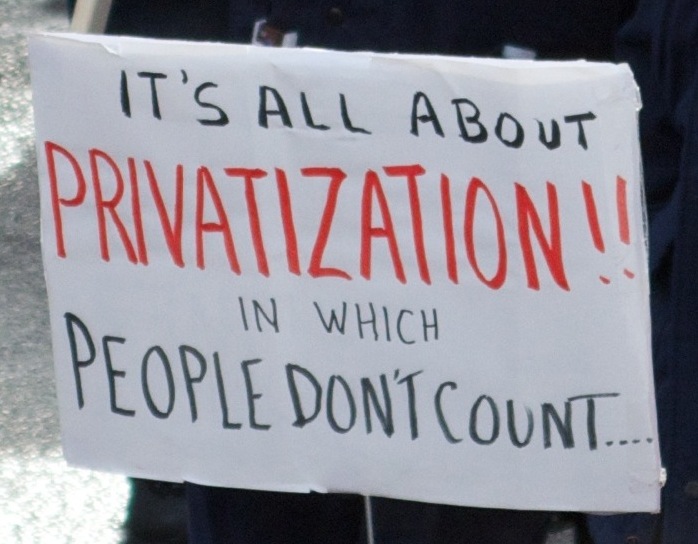 In Canada Post's opening
remarks to negotiations in
January
2016, it said, "For every dollar Canada Post earns, about
two-thirds goes to labour. While we intend to preserve high
quality jobs, it is imperative that we look at the terms and
conditions that were negotiated during a period when a strong
exclusive privilege existed and ask what is appropriate for
today's competitive environment." In Canada Post's opening
remarks to negotiations in
January
2016, it said, "For every dollar Canada Post earns, about
two-thirds goes to labour. While we intend to preserve high
quality jobs, it is imperative that we look at the terms and
conditions that were negotiated during a period when a strong
exclusive privilege existed and ask what is appropriate for
today's competitive environment."
Canada Post management refuses to accept responsibility
for
their actions which have resulted in the destruction of the
public Post Office. While they claim that two-thirds of every
dollar earned goes to labour which they characterize as a cost,
they conveniently forget that every dollar earned by Canada Post
comes from the value produced by the workers. It is turning truth
on its head to claim that the workers, who produce all the value
on which Canada Post operates, are the cause of the financial
problems. Meanwhile the hundreds of millions of dollars of revenue that
are
handed over to private interests like Shoppers Drug Mart and
International Monopoly Mailers are not even discussed.
With the neo-liberal drive for privatization and
deregulation
and the elimination of tens of thousands of jobs, the financial
crisis at Canada Post is self-inflicted and is part of the agenda
of the ruling circles to eliminate the public character of the
Postal Service and to destroy the ability of Canada Post to
fulfill its obligation to provide a universal postal service to
all Canadians. This obligation is a requirement of both the Canada
Post Corporation Act [1] and
the Universal Postal Convention.[2]
These are the most important issues which should be the
main items on the agenda of the "Task Force" conducting the review of
postal services. However, it is clear that the Trudeau government
intends to continue its neo-liberal agenda and is using the review to
further attack Canadian postal workers and the public post office.
Notes
1. Canada Post Corporation Act
Section 5:
2. While maintaining basic
customary
postal service, the Corporation, in carrying out its objects,
shall have regard to;
(a) the desirability of
improving and extending its
products
and services in the light of developments in the field of
communications;
(b) the need to conduct its
operations on a
self-sustaining
financial basis while providing a standard of service that will
meet the needs of the people of Canada and that is similar with
respect to communities of the same size;
(c) the need to conduct
its operations in such manner as will best provide for the
security of mail;
(d) the desirability of
utilizing the human resources
of the
Corporation in a manner that will both attain the objects of the
Corporation and ensure the commitment and dedication of its
employees to the attainment of those objects; and
(e) the need to maintain a
corporate identity program
approved by the Governor in Council that reflects the role of the
Corporation as an institution of the Government of Canada.
Section 14 -- Exclusive
Privilege of Corporation
14 (1) Subject to section
15, the Corporation has the
sole
and exclusive privilege of collecting, transmitting and
delivering letters to the addressee thereof within Canada.
2. Universal Postal Convention:
Article 3 -- Universal
Postal Service
1. In order to support the
concept of the single
postal
territory of the Union, member countries shall ensure that all
users/customers enjoy the right to a universal postal service
involving the permanent provision of quality basic postal
services at all points in their territory, at affordable
prices.
2. With this aim in view,
member countries shall set
forth,
within the framework of their national postal legislation or by
other customary means, the scope of the postal services offered
and the requirement for quality and affordable prices, taking
into account both the needs of the population and their national
conditions.
3. Member countries shall
ensure that
the offers of postal services and quality standards will be
achieved by the operators responsible for providing the universal
postal service.
4. Member countries shall
ensure that
the universal postal service is provided on a viable basis, thus
guaranteeing its sustainability.

Dangers Posed to Public Post Office by
Trans-Pacific
Partnership Trade Deal
While the review of Canada Post is taking place, the
Trudeau government is preparing conditions to approve the
Trans-Pacific Partnership (TPP) neo-liberal trade deal. Studies
show that the TPP will have serious implications for public
postal services in Canada. It is misleading to say the least to
tell Canadians that they will have a say in the kind of postal
service they want while preparing to implement the TPP, which
contains measures that will allow international monopolies to
interfere in the activities and mandate of Canada Post.
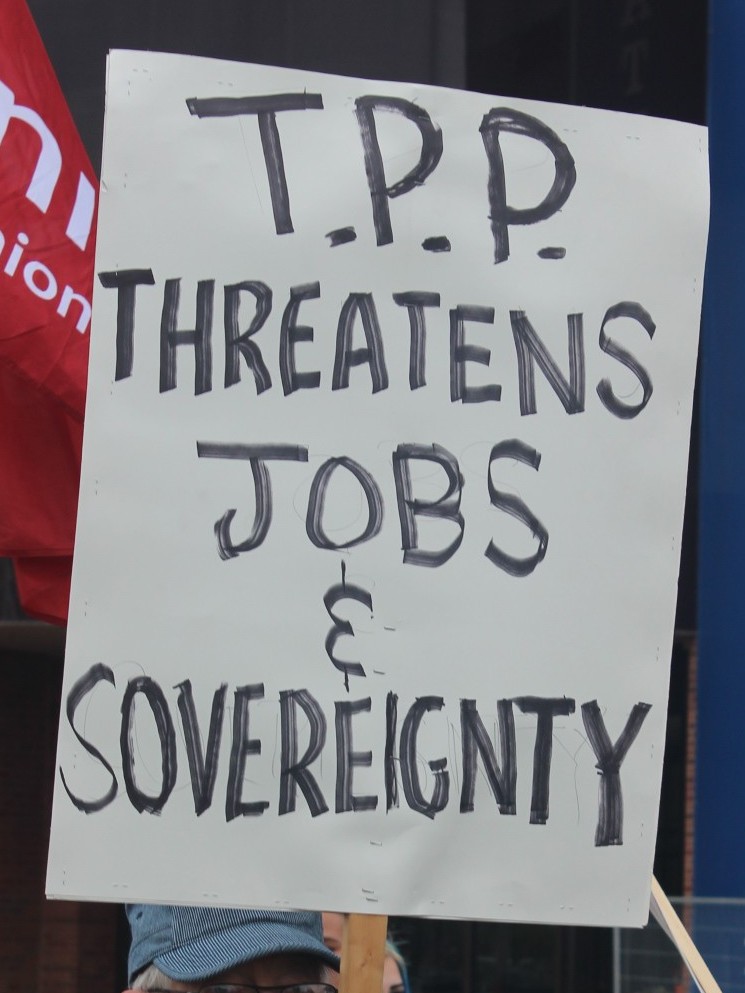 In spring 2016 the Canadian
Union of Postal Workers
(CUPW) sought
a legal opinion about the potential impacts of the TPP on Canada
Post. It was found that the rules contained in the TPP would interfere
in the legislative and regulatory
authority of the federal government concerning postal services
and in the current and future activities of Canada Post in the
following ways: In spring 2016 the Canadian
Union of Postal Workers
(CUPW) sought
a legal opinion about the potential impacts of the TPP on Canada
Post. It was found that the rules contained in the TPP would interfere
in the legislative and regulatory
authority of the federal government concerning postal services
and in the current and future activities of Canada Post in the
following ways:
1) TPP rules concerning "Cross-Border Trade in
Services"
include a detailed annex on "Express Delivery Services." These
new rules would not only limit the ability of Canada Post to
expand current services such as Xpresspost and those provided by
its subsidiary Purolator, but would threaten its ability to
maintain its current business model of integrated express
delivery and letter mail services.
2) TPP rules concerning "State Owned Enterprises"
(SOEs) and
monopolies also expand and make more explicit similar constraints
in NAFTA and the General Agreement on Trade in Services (GATS) on
the conduct of Canada Post in meeting its mandate to provide
universal postal services to Canadians while maintaining a viable
business model that includes express delivery services.
3) The TPP expands the scope for investor-state dispute
settlement ("ISDS") which has proven to be the most pernicious
feature of new "trade" liberalization rules and one that many
nations are now attempting to curtail. In so doing, the TPP
raises the spectre of another protracted investor-state claim
challenging the activities of Canada Post, like the UPS v. Canada
case.[1] This time such a claim
would
be buttressed by TPP
provisions concerning SOEs and monopolies and the Annex on
Express Delivery Services, which oppose the integration of
monopoly (letter-mail) and commercial (express delivery) services
that is at the heart of the Canada Post business model.
4) TPP rules concerning postal services closely reflect
the
objectives of the private courier industry, notably Fedex and
UPS, which committed substantial resources to influencing TPP
negotiations. The objective of the industry is to curtail or even
eliminate competition from public sector service providers,
particularly in the market for express delivery services. In aid
of that objective, the industry is seeking an enforceable right
to take advantage of Canada Post's national infrastructure
(sales, collection and delivery) -- without being encumbered by
its public service obligations.
It is clear that the main role of the TPP in relation
to the
post office is to entrench a neo-liberal model that seeks,
through deregulation and privatization to limit public sector
postal services. The legal advice received by CUPW pointed out,
"In large measure, these 'trade' rules reflect the agenda of
large transnational courier and express delivery companies (the
'courier industry') that for over twenty years have been engaged
in a campaign to limit the role of public postal services. While
efforts to persuade governments to deregulate postal services as
a matter of domestic policy have generally failed, the same
objectives are being pursued through trade negotiations."
What is most revealing about the direction of the
Trudeau
government in promoting the TPP is that, following in the
footsteps of the Harper government, they have failed to request to
be exempted from provisions of the trade deal that specifically
target postal services in favour of the international monopoly
courier services. The legal opinion obtained by the CUPW points
out that;
"This stands in stark contrast with broad reservations
maintained by other parties that are designed to protect their
own postal services."
For example, in its Annex II, "Japan reserves the right
to
adopt or maintain any measure relating to investments in or the
supply of... postal services in Japan." In its Annex II,
"Singapore reserves the right to adopt or maintain any measure
relating to Public Postal Licensee(s)." In both cases, the
substantive national treatment rules in Chapters 9 and 10 --
amongst others -- are expressly ousted from applying to their
postal services."
It must also be pointed out that both the Harper and
Trudeau
governments' refusal to protect postal services defies logic
since the following exemptions for Market Access were included in
the Comprehensive Economic and Trade Agreement (CETA) with the European
Union.
"Sector -- Postal Services: Type of Reservation: Market
Access
"Description: Cross-Border Trade in Services and
Investment
"The sole and exclusive privilege of collecting,
transmitting
and delivering letters (as defined in the Letter Definition
Regulations, SOR/83-481) within Canada is reserved for the postal
monopoly.
"For greater certainty, activities relating to the
exclusive
privilege may also be restricted, including the issuance of
postage stamps and the installation, erection or relocation in
any public place of any mail receptacle or device to be used for
the collection, delivery or storage of mail."
The legal opinion obtained by CUPW concludes with the
following:
"Canada offered no explanation for why it declined to
avail
itself of the opportunity to list similar reservations. The
failure to do so exposes Canada Post to the restrictive rules
described above, which may give rise to state-to-state disputes
under Chapter 28 or, in certain cases, to Investor-State disputes
under Chapter 9."
For the full legal opinion, click here.
Note
1. United Parcel Service (UPS)
launched a NAFTA challenge
against Canada Post in
April 2000 alleging "unfair competition." UPS contended Canada Post had
an unfair
advantage because its services such as XPress Post and Priority Courier
draw on an
infrastructure of sorting facilities, mailboxes and post offices that
private firms must provide
for themselves. The challenge was dismissed in 2007.

PREVIOUS
ISSUES | HOME
Website: www.cpcml.ca
Email: editor@cpcml.ca
|




 A modern constitution for
Canada must end the colonial
injustice suffocating the Indigenous peoples and implement the
principles of nation-to-nation relations. It must recognize
Quebec's right to self-determination, provide guarantees for
citizens and residents of the rights they possess by virtue of
being human, and set the stage for the democratic renewal of the
political process so that the peoples of Canada can directly
decide the matters that concern them and affect their lives.
A modern constitution for
Canada must end the colonial
injustice suffocating the Indigenous peoples and implement the
principles of nation-to-nation relations. It must recognize
Quebec's right to self-determination, provide guarantees for
citizens and residents of the rights they possess by virtue of
being human, and set the stage for the democratic renewal of the
political process so that the peoples of Canada can directly
decide the matters that concern them and affect their lives. A change from sovereignty residing in the monarch to
sovereignty residing in the people is not a minor one but a
radical departure from the rule of the few in their narrow
interests over the many, to the rule of the many in the broad
public interest. It is not possible to have a modern constitution
consistent with the aspirations and demands of the people at this
time in history without a clear affirmation and definition that
the people are sovereign. The sovereign power sanctions
everything fundamental in terms of the law of the land and
everything that emanates from it.
A change from sovereignty residing in the monarch to
sovereignty residing in the people is not a minor one but a
radical departure from the rule of the few in their narrow
interests over the many, to the rule of the many in the broad
public interest. It is not possible to have a modern constitution
consistent with the aspirations and demands of the people at this
time in history without a clear affirmation and definition that
the people are sovereign. The sovereign power sanctions
everything fundamental in terms of the law of the land and
everything that emanates from it. The fight for a republic in
Lower Canada against the
undemocratic rule of the colonial power and its local ruling
elite of the Chateau Clique comprised of rich and powerful
merchants had united all democratic-minded people whatever their
origin. Their struggle was accompanied by a similar uprising in
Upper Canada led by William Lyon Mackenzie directed against the
privileges and stranglehold of the ruling clique called the
Family Compact.
The fight for a republic in
Lower Canada against the
undemocratic rule of the colonial power and its local ruling
elite of the Chateau Clique comprised of rich and powerful
merchants had united all democratic-minded people whatever their
origin. Their struggle was accompanied by a similar uprising in
Upper Canada led by William Lyon Mackenzie directed against the
privileges and stranglehold of the ruling clique called the
Family Compact. The people are aware that
the deliberate silence of the
Justin Trudeau Liberals on the issue of Quebec is the seed of
tomorrow's hysteria and crises because it originates in the
obstinate refusal to recognize Quebec's right to
self-determination and the people's right to be and to govern
themselves with modern institutions. The ruling elite are
incapable of providing Canada with a modern perspective of a free
and equal union of the peoples of Canada, Quebec and Indigenous
peoples. In the Canadian federalism based on liberal notions of
empire-building, people are subjects and the sovereign power
resides in the monarch, which today is a front for the
concentration of power in the hands of the Prime Minister's
Office acting on behalf of the most powerful monopolies centred
in the U.S.-led imperialist system of states.
The people are aware that
the deliberate silence of the
Justin Trudeau Liberals on the issue of Quebec is the seed of
tomorrow's hysteria and crises because it originates in the
obstinate refusal to recognize Quebec's right to
self-determination and the people's right to be and to govern
themselves with modern institutions. The ruling elite are
incapable of providing Canada with a modern perspective of a free
and equal union of the peoples of Canada, Quebec and Indigenous
peoples. In the Canadian federalism based on liberal notions of
empire-building, people are subjects and the sovereign power
resides in the monarch, which today is a front for the
concentration of power in the hands of the Prime Minister's
Office acting on behalf of the most powerful monopolies centred
in the U.S.-led imperialist system of states. The Constitution does not
recognize the fiduciary obligations
of Canada as a country that was built through the colonial
seizure, occupation and exploitation of Indigenous lands and labour and
the
genocidal attempt to wipe them out as peoples. The fiduciary
obligations must ensure that the highest standard of living is
guaranteed to the Indigenous peoples and that all services are
provided to them at the highest possible level. Renewing on a
modern basis the relationships amongst sovereign Indigenous
nations, sovereign Quebec and sovereign Canada -- the sovereign
peoples as individuals and collectives -- is critical to the
renewal of Confederation and the modernization of the conditions
of life itself.
The Constitution does not
recognize the fiduciary obligations
of Canada as a country that was built through the colonial
seizure, occupation and exploitation of Indigenous lands and labour and
the
genocidal attempt to wipe them out as peoples. The fiduciary
obligations must ensure that the highest standard of living is
guaranteed to the Indigenous peoples and that all services are
provided to them at the highest possible level. Renewing on a
modern basis the relationships amongst sovereign Indigenous
nations, sovereign Quebec and sovereign Canada -- the sovereign
peoples as individuals and collectives -- is critical to the
renewal of Confederation and the modernization of the conditions
of life itself. Wild's comments indicate
the continuation of an oppressive
colonial relation. The fight of Indigenous peoples for
sovereignty on their lands and in all decision-making does not
have to answer to a greater power that decides for them and
claims that it represents the fabric of the nation. Sovereignty
means that the Indigenous peoples decide and their relations with
Canada are relations between sovereign entities with the modern
relationship enshrined in the Constitution. The renewal of the
Constitution must eliminate any vestige of colonial relations and
the catch-phrases such as "collaborative approach" etc, which
mean in practice the continuation of the status quo.
Wild's comments indicate
the continuation of an oppressive
colonial relation. The fight of Indigenous peoples for
sovereignty on their lands and in all decision-making does not
have to answer to a greater power that decides for them and
claims that it represents the fabric of the nation. Sovereignty
means that the Indigenous peoples decide and their relations with
Canada are relations between sovereign entities with the modern
relationship enshrined in the Constitution. The renewal of the
Constitution must eliminate any vestige of colonial relations and
the catch-phrases such as "collaborative approach" etc, which
mean in practice the continuation of the status quo. The Canadian Charter of
Rights and Freedoms was
incorporated into the patriated Constitution in 1982. The Charter
contains the provision of "reasonable limits [on rights and
freedoms] prescribed by law as can be demonstrably justified in a
free and democratic society." The Charter has fallen into
crisis and disrepute, as reasonable limits have been overtaken by
the arbitrary powers of the state known as police powers, which
dictate those rights the people may or may not have, just as Lord
Durham representing the colonial police power dictated in the
19th century. This has resulted in an endless arbitrary process
of criminalization of conscience and attacks against the
struggles of the people who oppose the anti-social offensive and
the war agenda of the ruling elite on the side of the U.S.
imperialists and U.S-led NATO.
The Canadian Charter of
Rights and Freedoms was
incorporated into the patriated Constitution in 1982. The Charter
contains the provision of "reasonable limits [on rights and
freedoms] prescribed by law as can be demonstrably justified in a
free and democratic society." The Charter has fallen into
crisis and disrepute, as reasonable limits have been overtaken by
the arbitrary powers of the state known as police powers, which
dictate those rights the people may or may not have, just as Lord
Durham representing the colonial police power dictated in the
19th century. This has resulted in an endless arbitrary process
of criminalization of conscience and attacks against the
struggles of the people who oppose the anti-social offensive and
the war agenda of the ruling elite on the side of the U.S.
imperialists and U.S-led NATO. The need to renew the
Constitution to vest sovereignty in the
people and guarantee their rights as the basis of Canadian
sovereignty has never been greater. Political and constitutional
renewal, far from being outdated or what the ruling elite call "a
divisive issue," is central to opening the path to the progress of
society. In this regard, the Canadian working class and other
social classes and strata should seize the occasion of the
preparations for the 150th anniversary of Confederation to
examine the evolution of the democratic institutions in Canada,
the interests they serve, in what direction they are being taken
and what needs to be done to give form and content to the
people's aspirations for sovereignty, empowerment and
enlightenment, and the right to decide and control those
political, economic and social affairs that affect their lives.
This initiative is most timely and necessary to chart our destiny
in a way that is beneficial to the people.
The need to renew the
Constitution to vest sovereignty in the
people and guarantee their rights as the basis of Canadian
sovereignty has never been greater. Political and constitutional
renewal, far from being outdated or what the ruling elite call "a
divisive issue," is central to opening the path to the progress of
society. In this regard, the Canadian working class and other
social classes and strata should seize the occasion of the
preparations for the 150th anniversary of Confederation to
examine the evolution of the democratic institutions in Canada,
the interests they serve, in what direction they are being taken
and what needs to be done to give form and content to the
people's aspirations for sovereignty, empowerment and
enlightenment, and the right to decide and control those
political, economic and social affairs that affect their lives.
This initiative is most timely and necessary to chart our destiny
in a way that is beneficial to the people.










 Media reports are crowing
that for the first time since
the
Summits began in 2005, all three governments "are ruled by
centrist parties." The financial oligarchs are euphoric that they
have such governments that can pull off war preparations,
neo-liberal free trade agreements and an unprecedented sellout of
the people under the noses of the people themselves.[
Media reports are crowing
that for the first time since
the
Summits began in 2005, all three governments "are ruled by
centrist parties." The financial oligarchs are euphoric that they
have such governments that can pull off war preparations,
neo-liberal free trade agreements and an unprecedented sellout of
the people under the noses of the people themselves.[ These matters are a serious
concern to Canadians. The
Liberal
government is accelerating the restructuring of the state to pay
the rich, further disempowering the people and increasing
Canada's participation in U.S. imperialist war preparations. The
neo-liberal war summit of Fortress North America points to an
existential crisis facing Canada and highlights the grave dangers
for the Canadian people should the U.S. imperialists succeed in
embroiling Canada in missile defence, nuclear blackmail, its
politics of assassination and stepped up preparations for world
war.
These matters are a serious
concern to Canadians. The
Liberal
government is accelerating the restructuring of the state to pay
the rich, further disempowering the people and increasing
Canada's participation in U.S. imperialist war preparations. The
neo-liberal war summit of Fortress North America points to an
existential crisis facing Canada and highlights the grave dangers
for the Canadian people should the U.S. imperialists succeed in
embroiling Canada in missile defence, nuclear blackmail, its
politics of assassination and stepped up preparations for world
war.


 The latest killings follow
the state-organized
disappearance and presumed murder in 2014 of 43 Mexican students,
many of them student teachers at the Ayotzinapa normal school in
the state of Guerrero. Two years later, no justice has been
provided, and far from the government being held to account,
disappearances continue with impunity.
The latest killings follow
the state-organized
disappearance and presumed murder in 2014 of 43 Mexican students,
many of them student teachers at the Ayotzinapa normal school in
the state of Guerrero. Two years later, no justice has been
provided, and far from the government being held to account,
disappearances continue with impunity.



 The demands of the
corporation for concessions are a
serious
attack on postal workers' rights on wide-ranging issues that will
affect all classifications. These include:
The demands of the
corporation for concessions are a
serious
attack on postal workers' rights on wide-ranging issues that will
affect all classifications. These include: Postal workers know from
their experience that
negotiations with the Crown corporation Canada Post are in fact
negotiations with the federal cabinet and this round is no
different. To support the vicious attack of the corporation on
the wages, working conditions and benefits of postal workers, the
Trudeau government has launched a diversionary "national
consultation" on the mandate of Canada Post. Although the
government claims that this review will give all Canadians a
chance to be consulted about the kind of post office they want,
it is clear that this exercise is timed to put further pressure
on the workers to accept severe rollbacks.
Postal workers know from
their experience that
negotiations with the Crown corporation Canada Post are in fact
negotiations with the federal cabinet and this round is no
different. To support the vicious attack of the corporation on
the wages, working conditions and benefits of postal workers, the
Trudeau government has launched a diversionary "national
consultation" on the mandate of Canada Post. Although the
government claims that this review will give all Canadians a
chance to be consulted about the kind of post office they want,
it is clear that this exercise is timed to put further pressure
on the workers to accept severe rollbacks. Harper also appointed as
head of Canada
Post Deepak Chopra, a
past President of Pitney Bowes in Canada, a major
international monopoly corporation in the mailing industry. Chopra was
appointed to continue the destruction of the public
post office by a full-scale centralization of mail processing
into a handful of large plants across the country. This led to
the closure of important processing plants in Quebec City,
Windsor, London and many other centres. The goal of this plan is
to reduce mail processing to four or five main plants across the
country, leading to the displacement of thousands of workers
along with severe reductions of the workforce.
Harper also appointed as
head of Canada
Post Deepak Chopra, a
past President of Pitney Bowes in Canada, a major
international monopoly corporation in the mailing industry. Chopra was
appointed to continue the destruction of the public
post office by a full-scale centralization of mail processing
into a handful of large plants across the country. This led to
the closure of important processing plants in Quebec City,
Windsor, London and many other centres. The goal of this plan is
to reduce mail processing to four or five main plants across the
country, leading to the displacement of thousands of workers
along with severe reductions of the workforce. In Canada Post's opening
remarks to negotiations in
January
2016, it said, "For every dollar Canada Post earns, about
two-thirds goes to labour. While we intend to preserve high
quality jobs, it is imperative that we look at the terms and
conditions that were negotiated during a period when a strong
exclusive privilege existed and ask what is appropriate for
today's competitive environment."
In Canada Post's opening
remarks to negotiations in
January
2016, it said, "For every dollar Canada Post earns, about
two-thirds goes to labour. While we intend to preserve high
quality jobs, it is imperative that we look at the terms and
conditions that were negotiated during a period when a strong
exclusive privilege existed and ask what is appropriate for
today's competitive environment." In spring 2016 the Canadian
Union of Postal Workers
(CUPW) sought
a legal opinion about the potential impacts of the TPP on Canada
Post. It was found that the rules contained in the TPP would interfere
in the legislative and regulatory
authority of the federal government concerning postal services
and in the current and future activities of Canada Post in the
following ways:
In spring 2016 the Canadian
Union of Postal Workers
(CUPW) sought
a legal opinion about the potential impacts of the TPP on Canada
Post. It was found that the rules contained in the TPP would interfere
in the legislative and regulatory
authority of the federal government concerning postal services
and in the current and future activities of Canada Post in the
following ways: